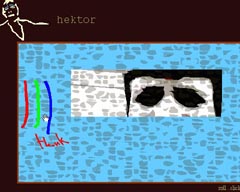
Hektor.net
|
Author: Nathaniel Stern
Web URL or medium: Java applet at hektor.net
Description: hektor is one of the main characters in the non-aggressive narrative - a mode of Benjaminian storytelling. The NAN proposes the "continuation of a story which is just unfolding." I use digital and traditional media to create encounters between an ambiguous 'I' and potential 'You.' By embracing memory as a collage in motion through multiple characters, the NAN implies an origin story that may or may not have occurred. You are invited to co-invent this unfolding 'past,' and its openness suggests possibility and multiplicity. In a 1965 interview with Michael Kirby, John Cage said that theatre is not done to its viewers; they do it to themselves.
The NAN depends on that. As viewers re-member along with the narrative, they complete / become the work of art. Alongside the NAN, the self ('You' and 'I') is unfolding and in process. hektor.net is hektor's navigable artsite of photography, spoken word and video poetry. While viewers surf the site, hektor attempts to re-member: embody a past in the present. Floating memories, re-presented as art pieces, congeal in different patterns; from the "ruins of memory," viewers re-invent the past and its meaning, piecing together a story for themselves. However, similar to Julio Cortazar's Hopscotch, where readers can tackle any chapter, in any order, to assemble a whole story, this narrative is built by the listener, according to which pieces they have seen, in what context, and in which order. Viewers continually bring new insights to possibility by juxtaposing visited and revisited pieces and ideas several times over.
Technical requirements: hektor.net requires an Ethernet connection, a 4.0 browser or higher and the latest Flash and QuickTime plug-ins.
Start/Restart instructions: Load URL to start. Reload URL to restart.
Gallery: ELO Gallery home | Contributing artists | Titles
